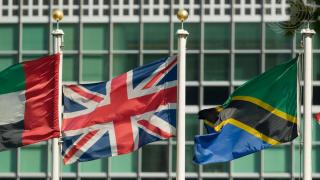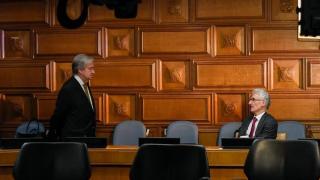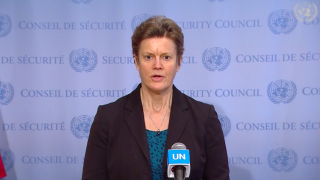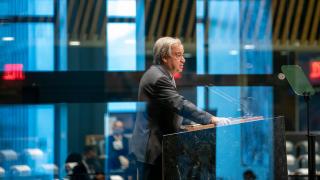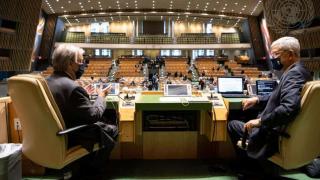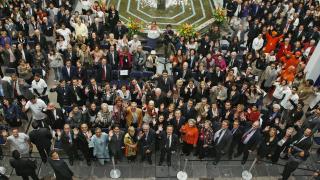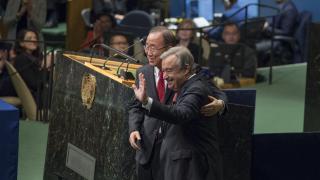
Former Portuguese Prime Minister António Guterres has been sworn in as the ninth UN Secretary-General. His appointment marks the culmination of the most open, meritocratic appointment process in the history of the United Nations.
Mr Guterres, who is also the former UN High Commissioner for Refugees, took the Oath of Office on 12 December and formally succeeded Ban Ki-moon as UN leader on 1 January 2017. At the swearing-in ceremony, Mr Guterres introduced his plans to build a more 'people-centred' United Nations:
The United Nations needs to be nimble, efficient and effective. It must focus more on delivery and less on process; more on people and less on bureaucracy
Mr Guterres takes the helm of the United Nations at a time of widespread disillusionment in international institutions such as the United Nations, with many UN member states choosing to turn inwards in response to global crises such as climate change, terrorism and forced displacement. He is also taking up the reins of an overstretched, underfunded organisation that is increasingly required to do more with less political and financial support.
In his inauguration speech, Mr Guterres acknowledged the wealth of challenges he now faces as Secretary-General, and highlighted three strategic priorities for the Organization going forward: working for peace; supporting sustainable development; and reforming its internal management. Specifically, he recognised the need for greater conceptual clarity of the scope of UN peacekeeping, and promised comprehensive reform of the UN development system in order to ensure it works in coordination with UN humanitarian agencies:
“Humanitarian response, sustainable development and sustaining peace are three sides of the same triangle”
The new Secretary-General's appointment set an important precedent as the most open, transparent, and merit-based leadership in the UN's 70-year history. Member states, civil society and the wider public were able to engage with candidates during informal dialogues at the General Assembly and televised debates, following two years of advocacy by UNA-UK and its 1 for 7 Billion campaign.
Mr Guterres noted this historic process in his inauguration speech, promising to "build on existing efforts" to improve UN recruitment processes. He also promised to "reach full gender parity at the Under-Secretary-General and Assistant Secretary-General levels" by the end of his mandate.
UNA-UK's priorities for the UN Secretary-General
Originally published in the latest issue of UNA-UK's magazine: 'Facts still matter'
Throughout the selection process, there were calls for the next Secretary-General to focus on a dizzying number of issues, and to be not only the world’s top diplomat, but also an inspiring communicator, a voice for the poor, a hard- headed reform driver, a negotiator and more. Mr Guterres will need to prioritise.
UNA-UK has set out its suggestions to the House of Lords International Relations Committee and to Mr Guterres’ transition team. They include:
- Setting an ambitious but realistic vision that sees the UN focus on areas where it can make a unique contribution – notably resuming a central role in peace and security
- Actively seeking to improve big power relations, which are hindering the UN’s ability to address pressing con ict and humanitarian situations
- Taking a hands-on approach in con ict negotiations and strengthening the UN’s mediation capacity, including through the appointment of female mediators
- Pressing ahead with last year’s reform reports on peace operations, peacebuilding, and women, peace and security
- Calling for an international accountability mechanism to address sexual abuse by peacekeepers
- Developing a clear plan for the UN’s contribution to implementing the SDGs and Paris Agreement. This should focus on encouraging, advising and monitoring states, and be accompanied by proposals for moving the UN away from the direct provision of development services towards reinforcing its humanitarian response capacity
- Working with states and the UN system to flesh out the New York Declaration for Refugees and Migrants
- Creating concrete plans for taking forward the Human Rights up Front initiative, including by strengthening communication and referral channels between different parts of the UN system
- Creating concrete plans for improving gender equality and women’s representation within the UN system, starting with the appointment of a diverse and highly quali ed senior management group
- Capitalising on civil society and public engagement with the UN as a result of the new Secretary-General selection process, including by appointing a high-level focal point for civil society

